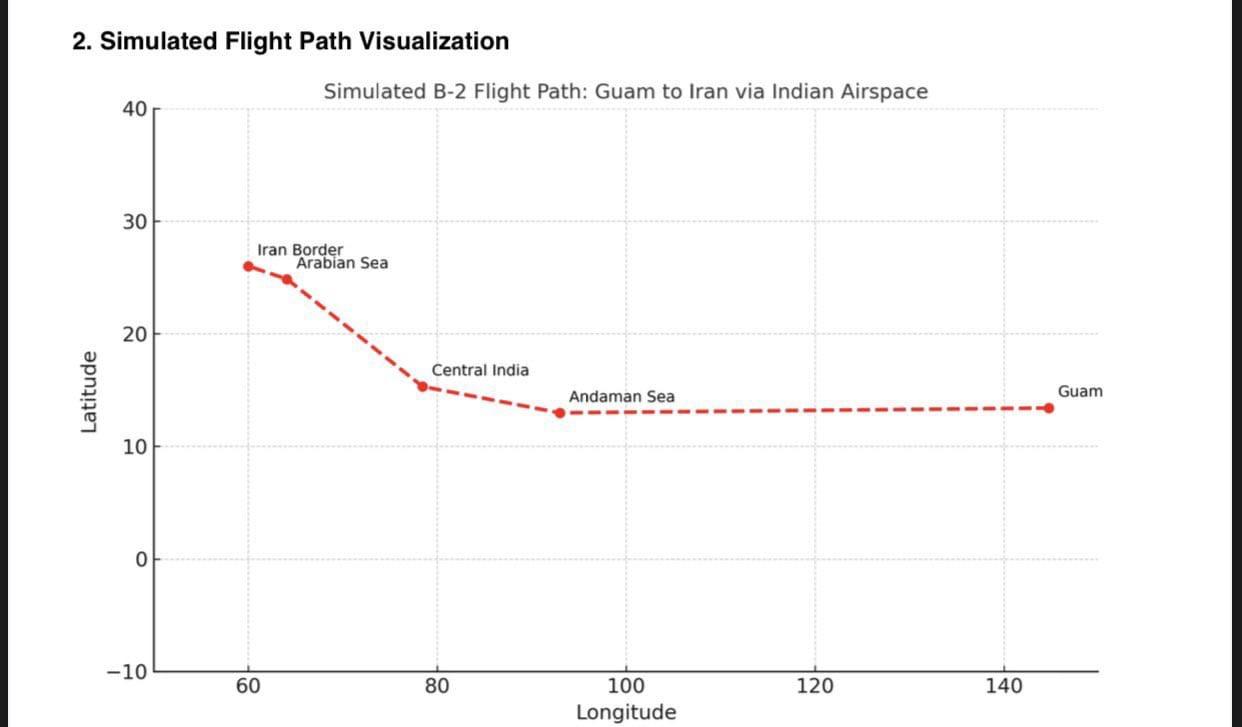Islamabad, June 22, 20225: In a major geopolitical jolt, leaked intelligence and flight data have surfaced suggesting that the United States may have used Indian territory to launch a covert strike on Iran, reportedly targeting sensitive nuclear installations.
The simulated flight path shows a B-2 bomber traveling from Guam to Iran, curving through Indian airspace—raising serious questions about New Delhi’s involvement in a highly controversial mission.
According to reports, the military aircraft maneuvered close to Indian-controlled zones before breaching Iranian airspace earlier this week. Tehran has reacted sharply, calling the strike a “blatant act of aggression” and demanding a formal probe by the United Nations. Iran’s Foreign Ministry warned of serious consequences if the involvement of foreign territories, including India, is confirmed.
Indian officials have chosen silence—neither confirming nor denying the use of their airspace. This non-committal stance has sparked speculation about a possible strategic realignment between India and the United States, especially in defense and intelligence sharing. If proven true, such collaboration may signal India’s quiet pivot from its traditionally balanced foreign policy toward deeper ties with Western powers.
Diplomatic analysts warn this incident could severely strain India’s longstanding relationships with key partners like Iran, Russia, and China. It also risks destabilizing an already fragile Gulf region, where U.S.-Iran tensions have repeatedly pushed the boundaries of conflict.
Experts believe this development could be a turning point, possibly ushering in a new era of militarized diplomacy in South Asia and the Middle East. As global leaders demand transparency, India now finds itself at the center of a storm that could redefine its role in the international order.
Strategic Fallout for India and the Region
If the claim is validated, India could face diplomatic isolation from its traditional allies such as Iran, Russia, and China, while drawing itself deeper into US-led defense blocs. This development also threatens to escalate already fragile US-Iran relations, putting further strain on Gulf stability.
Security experts fear that the incident may serve as a turning point in the regional power balance, possibly igniting a broader conflict if not diplomatically defused in time.
Read More: Trump Says He deserves Nobel Peace Prize for Global Diplomacy
The allegation that the US used Indian territory to attack Iran has the potential to reshape the geopolitical landscape. As world leaders seek clarification, this incident could mark the beginning of a new era of militarized diplomacy in South Asia and the Middle East.
Read More: Shahbaz Sharif Calls Iranian President to Discuss Fallout of Nuclear Site Attacks









